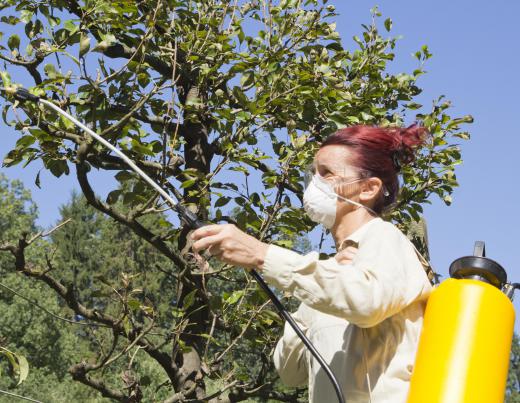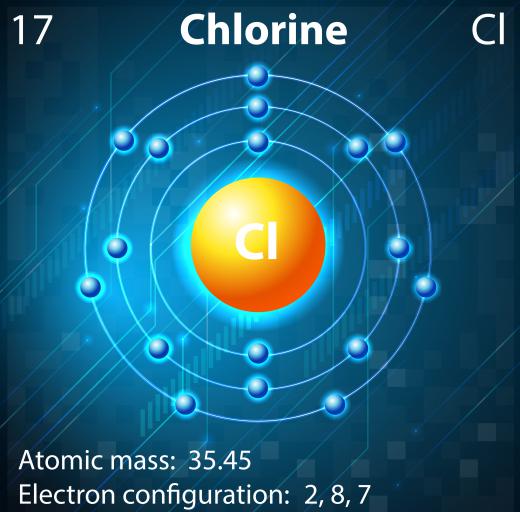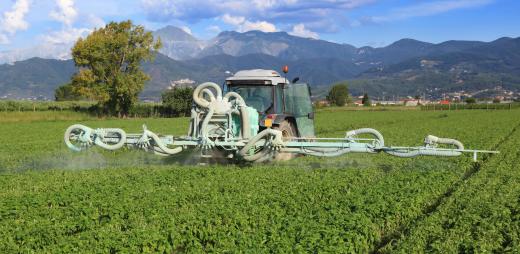What are Chlorinated Hydrocarbons?
 Mary McMahon
Mary McMahon
Chlorinated hydrocarbons are organic molecules characterized by the presence of at least one chlorine atom bonded to a carbon atom. Compounds which contain these molecules have a wide range of uses, from making cookware to creating industrial solvents. Numerous companies manufacture or work with these molecules, also known as chlorocarbons or organochlorides. Many people interact with products made with these chemicals on a daily basis, although they may not be aware of this fact.
In some cases, chlorinated hydrocarbons are made in nature. They are naturally present in a number of animals, and sometimes appear as byproducts of events like fires. In other cases, they must be made in a laboratory environment. Vinyl chloride, for example, is manufactured in large amounts to produce polyvinyl chloride (PVC) pipe and other materials. Likewise, chlorinated hydrocarbons are also manufactured to produce pesticides, solvents, precursors to various industrial processes, coatings, polymers, and synthetic rubber products.

The issue with chlorinated hydrocarbons is that they can pose a threat to human and environmental health. If released into the environment, they can cause sickness, birth defects, and other problems. In some cases, these problems may not be readily apparent. The pesticide DDT, for example, is made with chlorinated hydrocarbons, and while it initially appeared safe to use, scientists later realized that it endangered bird populations by weakening the shells of eggs, making it less likely for embryos to survive to hatching.

Companies which manufacture these chemicals must do so with care to avoid accidentally releasing them into the environment. Many such companies are also interested in minimizing waste, as are governments, which would like to see the production of some chlorinated hydrocarbons slow down for the sake of the environment. Tight controls in factories can help reduce the risk of environmental problems, as can careful directions for consumers so that they understand the danger in using products derived from these molecules.

As a general rule, products made with chlorinated hydrocarbons should not be poured down the drain or released into the street. Instead, people should hold on to them until they can deposit them with a company which handles hazardous waste disposal. Pesticides and solvents should be tightly controlled and used only as directed, with proper face and mouth protection to avoid injury. There may also be alternatives available for people who would prefer to use more environmentally friendly practices; listing of alternatives are available through environmental organizations.
AS FEATURED ON:
AS FEATURED ON:















Discussion Comments
The poison in mobile homes that caused such an uproar was formaldehyde, not hydrocarbons. Those homes are required to have warnings on them but who knows what happens when they're resold?
Chlorinated hydrocarbons are actually used as stabilizing agents themselves. They are used on PVC pipe to keep it chemically stable. They're so stable that it's been hard to come up with good ways to get rid of them! They linger in the environment and even though some is naturally produced, we produce too much more that causes environmental and health concerns. Hydrocarbon remediation at impacted sites is an ongoing issue.
Are these chemicals stabilized in manufacturing? Don't they still leach out of a product during the product's lifetime? Children;s play tents use PVC pipe for the frame; sometimes there are warnings on them because CA law (Prop. 65) requires notifying parents of the hazard. Isn't this also what's in mobile homes, something else that requires warning labels?
Of course, if they occur in nature, they shouldn't be too bad. What are the benefits over other options? We know the health effects pesticides have on people as well as why they were beneficial but we never seem to discover both at the same time.
Post your comments